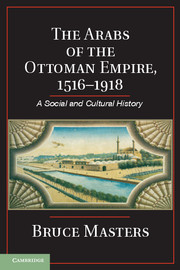Book contents
- Frontmatter
- Contents
- Acknowledgments
- Abbreviations
- Note on Transliteration
- Introduction
- 1 The Establishment and Survival of Ottoman Rule in the Arab Lands, 1516–1798
- 2 Institutions of Ottoman Rule
- 3 Economy and Society in the Early Modern Era
- 4 A World of Scholars and Saints
- 5 The Empire at War
- 6 The Tanzimat and the Time of Re-Ottomanization
- 7 The End of the Relationship
- Conclusion For the Faith and State
- Bibliography
- Index
- References
Introduction
Published online by Cambridge University Press: 05 April 2013
- Frontmatter
- Contents
- Acknowledgments
- Abbreviations
- Note on Transliteration
- Introduction
- 1 The Establishment and Survival of Ottoman Rule in the Arab Lands, 1516–1798
- 2 Institutions of Ottoman Rule
- 3 Economy and Society in the Early Modern Era
- 4 A World of Scholars and Saints
- 5 The Empire at War
- 6 The Tanzimat and the Time of Re-Ottomanization
- 7 The End of the Relationship
- Conclusion For the Faith and State
- Bibliography
- Index
- References
Summary
Two recent events illustrate the ambivalent space that the Ottoman Empire occupies in the historical imagination of Arabs living in the twenty-first century. In January 2002 Saudi developers razed Qasr Ajyad, an Ottoman-era fortress that had stood watch over Mecca for two centuries. They envisioned in its place a hotel with splendid views of the holy city that would provide luxurious surroundings for wealthier pilgrims and visitors. The decision to demolish the fortress was unproblematic from a Saudi perspective. Qasr Ajyad was of a recent vintage when compared to other Middle Eastern historical monuments, and there was no local outcry for its preservation. Nonetheless, İstemihan Talay, Turkey’s minister of culture, compared its leveling to the Taliban’s wanton destruction of the statues of the Buddha in Bamiyan in the previous year. With popular outrage growing at home over what was portrayed in the Turkish media as a slight to the honor of the nation, Minister Talay requested that UNESCO condemn the Saudi action as it had the obliteration of the “world heritage” site in Afghanistan. Arab commentators, in contrast, were dismissive of the protests, which they ascribed to a residual bitterness on the part of the Turks that their ancestors had lost control of the Arabian Peninsula in 1918. In the end, UNESCO decided that as the fortress was not on its list of places that merited preservation, its fate was a matter solely within the purview of the Saudi authorities.
- Type
- Chapter
- Information
- The Arabs of the Ottoman Empire, 1516–1918A Social and Cultural History, pp. 1 - 19Publisher: Cambridge University PressPrint publication year: 2013



